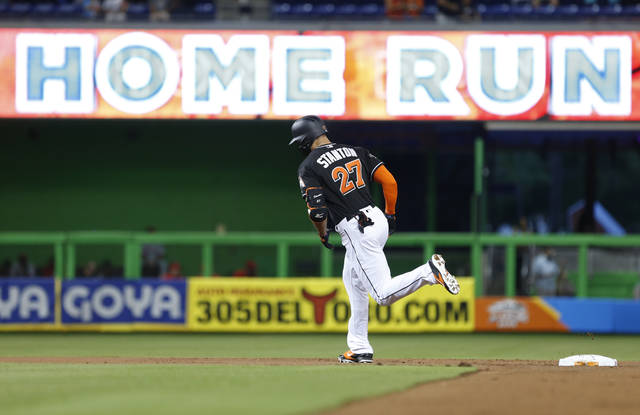NEW YORK — Giancarlo Stanton’s smacks, Aaron Judge’s jolts and all those dizzying long balls helped Major League Baseball move another poke closer to the inevitable. ADVERTISING NEW YORK — Giancarlo Stanton’s smacks, Aaron Judge’s jolts and all those dizzying
NEW YORK — Giancarlo Stanton’s smacks, Aaron Judge’s jolts and all those dizzying long balls helped Major League Baseball move another poke closer to the inevitable.
Nearly two decades after the height of the Steroids Era, the sport is on track to break its season record for home runs on Tuesday — and not just top the old mark, but smash it like one of those upper-deck shots that have become commonplace in the Summer of the Slugger.
There were 5,663 home runs hit through Sunday, 30 shy of the record set in 2000.
Juiced balls? Watered-down pitching? Stanton’s renaissance? Sensational starts by Judge and Cody Bellinger?
“I don’t think that we are ever going to have a single explanation for exactly why we’ve see so many,” baseball Commissioner Rob Manfred said. “But players are bigger and stronger. They’re playing a little differently, in terms of the way they swing. Pitchers throw harder. The one thing I remain comfortable with: Nothing about the baseball, according to our testing, is materially different.”
There were 5,610 homers last year, an average of 2.31 per game, and this year’s average of 2.53 projects to 6,143. That would be up 47 percent from 4,186 in 2014.
In just three years, home runs will have increased by 1,957 — an extra 149 miles of long balls at this year’s average home run length of 400 feet, or 15 miles more than the driving distance between Philadelphia’s Citizen’s Bank Park and Washington’s Nationals Park.
“The game has changed,” New York Yankees manager Joe Girardi said. “From when I started, there’s a lot less stolen bases, there’s a lot less bunting, there’s a lot less hitting-and-running. You don’t give outs away, and you let guys swing the bat.”
Already 107 players have hit 20 homers this year, just three shy of the record set last season — and up from 64 in 2015, according to the Elias Sports Bureau.
“The ball seems to soar from people that are hitting it farther than maybe they did a year ago … and they kind of look like the same person,” Minnesota manager Paul Molitor, a Hall of Famer hitter, said before Monday night’s game at Yankee Stadium.
Along with sailing shots come strikeouts, which will set a record for the 10th consecutive year. There were 36,964 whiffs through Sunday, an average of 8.25 per team per game that translates to 40,099.
“The focus is hitting homers and tolerating strikeouts,” Reggie Jackson said. “I don’t really like all the strikeouts, and I was the king.”
Baseball officials are worried about decreasing action and have been alarmed by the strikeout rise. This year’s total is up from 38,982 last year and an increase of nearly 8,000 from the 32,189 in 2007. The strikeout spike coincides with a rise in fastball velocity; four-seamers have averaged 93.2 mph this year, up from 91.9 mph in 2008, according to MLB data.
“These bullpens are making it extremely difficult. From basically the starter on you’re going to have elite, hard-throwing guys that are looking to strike you out every single time,” said Baltimore’s Mark Trumbo, last year’s home run champion. “The game right now is as max effort as I’ve seen it. Guys are throwing harder. At the plate sometimes you have no choice. It’s hard to steer the ball around when it’s 98 miles an hour and up in the zone.”
Jackson set a record with 2,597 career strikeouts, maxing at 171 in 1968. Six players already have reached 171 this year, led by the Yankees’ Judge at 197. He could break Mark Reynolds’ season record of 223, set in 2009.
“You’d have been on the bench,” Jackson said. “But I don’t know if you set a guy on the bench with 90 RBIs and 40 homers. That’s Judge. You ain’t going to sit that on the bench.”
Steroids fueled the home run surge in the late 1990s and early 2000s, and power subsided after the start of drug testing with penalties in 2004. The home run average dropped in 2014 to its lowest level since 1992, then started rising during the second half of the 2015 season.
MLB has the UMass-Lowell’s Baseball Research Center conduct periodic testing of baseballs and University of Illinois physics professor emeritus Alan Nathan consults as part of quality control. The sport has said repeatedly that baseballs fall within the specifications in the rules.
Manfred isn’t worried some undetectable substance is fueling the new rise.
“I have never said that it’s impossible there’s something out there that we’re missing,” he said. “What I am saying is we’re doing more, more frequently, less predictably, with better testing, and that’s all you can do.”



